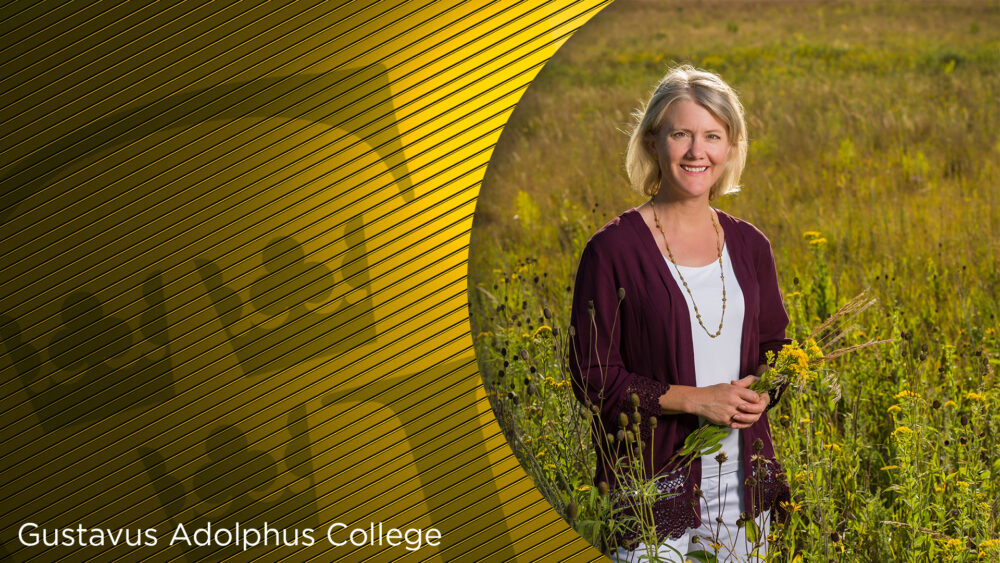
With opportunities ranging from STEM to international relations, fellowships offer Gustavus Adolphus College students across all majors the chance to pursue research projects, learn a language, receive scholarship funds, and continue their education through nationally and internationally recognized programs. Last year, 40 percent of students who applied for these highly competitive fellowships received an award or honorable mention, proving that a pandemic wouldn’t stand in the way of Gusties chasing their goals.
Biology professor and fellowships coordinator Pamela Kittelson regularly sits down with students to help find a fellowship that aligns with their goals and coaches them through the application process. Here’s what she had to say for students who are interested in applying:
Gustavus: Can you give an overview of the types of fellowship opportunities available to Gustavus students?
Kittelson: There are three broad categories of awards: fellowships for current students to work abroad or do research for a summer; opportunities for students to earn tuition money, usually related to research; and postgraduate programs to send them to graduate school, often in policy or government work, or to fund some kind of work or research opportunity abroad.
Gustavus: Why should students consider applying for a fellowship? How is it different from an internship or faculty research?
Kittelson: They’re great opportunities to develop professionally, in that these applications ask you to think about your future and where you are going, as well as what have you done in your past and how has that shaped you as a person. Internships and research with a professor are great opportunities, but sometimes students just have to submit a resume or have a conversation with a professor. Moreover, these fellowships are prestigious, nationally recognized names that build your network. Not that an internship wouldn’t give you that, but perhaps it doesn’t have the national recognition that, say, a Fulbright, a Goldwater, or a Truman Scholar might have.
Gustavus: What about applying for a fellowship has been most beneficial to students, even if they don’t get accepted?
Kittelson: I would say all of the students, regardless of their status after applying, say it made them think about who they are, what they value, and what they want to do in the future with their skill set. And they can take the materials that they produced for an application and use them in other job applications, or in graduate school, or when they apply for another fellowship. They have also found once they’ve graduated that this is something that they’re asked to do time and again, and they’ve gotten practice in a very practical way.
Gustavus: Last year, half of Gustavus students who received fellowship awards identified as BIPOC and/or first-generation students. How do these programs offer students opportunity and social mobility?
Kittelson: They certainly offer a lot of students a chance to study abroad where in some instances it’s financially difficult. Programs like Gilman or Fulbright can send someone abroad, and they’ll pay for everything, same with Critical Language scholarships. So fellowships can provide social mobility for the individual, but then students also develop that network that is so important for all of us to get established. If you can have a network that includes the U.S. Department of State — which is the case for Critical Language, Boren, Fulbright, or any other U.S. State Department fellowship — that’s an opportunity to get jobs with a federal agency, which can include anything from medicine to agriculture, legislative policy to national security. You get added to what’s called a non-competitive hire status, which means that a federal agency has to look at your resume first before they look at others. So as long as you meet the qualifications for the job, it’s an extra step up.
Gustavus: Should students really be applying now? What about COVID-19 and travel restrictions?
Kittelson: A lot of foundations have been creative in how they’ve offered opportunities. So for example, the Critical Language scholarship still moved forward virtually, and the Gustavus student who earned it this year in Mandarin Chinese said it was phenomenal. She found her tribe, a set of people she feels are going to be lifelong friends and associates, and she met a lot of new people even though it was in a virtual format. She’s looking forward to next year and potentially being able to go to Taiwan as part of the program.
The situation in other countries is very fluid right now, it’s true, but we don’t know how things might change 15 months from now, which is usually how long it takes to find out if you’re accepted. So you just have to go for it — why not?
Students interested in applying for a fellowship are encouraged to fill out the Fellowship Office’s first meeting form to schedule an appointment. For more information about the Gustavus Fellowships Office and the support it gives to students, please visit the fellowships website.
###
Media Contact: Director of Media Relations and Internal Communication Luc Hatlestad
luch@gustavus.edu
507-933-7510